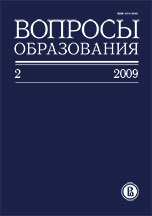Наиболее читаемые статьи этого автора (авторов)
- Александр Прутченков, Татьяна Новикова, Марина Пинская, Учительский портфолио студента-педагога , Вопросы образования / Educational Studies Moscow: № 4 (2005)
- Татьяна Новикова, Марина Пинская, Александр Прутченков, Елена Федотова, Портфолио в зарубежной образовательной практике , Вопросы образования / Educational Studies Moscow: № 3 (2004)
- Марина Пинская, Сергей Косарецкий, Исак Фрумин, Школы, эффективно работающие в сложных социальных контекстах , Вопросы образования / Educational Studies Moscow: № 4 (2011)
- Марина Пинская, Анализ учебных пособий для начальной школы , Вопросы образования / Educational Studies Moscow: № 1 (2009)
- Гордей Ястребов, Марина Пинская, Сергей Косарецкий, Использование контекстных данных в системе оценки качества образования: опыт разработки и апробация инструментария , Вопросы образования / Educational Studies Moscow: № 4 (2014)
- Гордей Ястребов, Алексей Бессуднов, Марина Пинская, Сергей Косарецкий, Проблема контекстуализации образовательных результатов:школы, социальный состав учащихся и уровень депривации территорий , Вопросы образования / Educational Studies Moscow: № 4 (2013)
- Ирина Груничева, Марина Пинская, Сергей Косарецкий, Поддержка школ, показывающих низкие образовательные результаты, как часть национальной образовательной политики. Обзор мирового опыта , Вопросы образования / Educational Studies Moscow: № 3 (2012)
- Наталья Дербишир, Марина Пинская, Управленческие стратегии директоров эффективных школ , Вопросы образования / Educational Studies Moscow: № 3 (2016)
- Марина Пинская, Алена Пономарева, Сергей Косарецкий, Профессиональное развитие и подготовка молодых учителей в России , Вопросы образования / Educational Studies Moscow: № 2 (2016)
- Марина Пинская, Татьяна Хавенсон, Сергей Косарецкий, Роман Звягинцев, Александра Михайлова, Татьяна Чиркина, Поверх барьеров: исследуем резильентные школы , Вопросы образования / Educational Studies Moscow: № 2 (2018)








